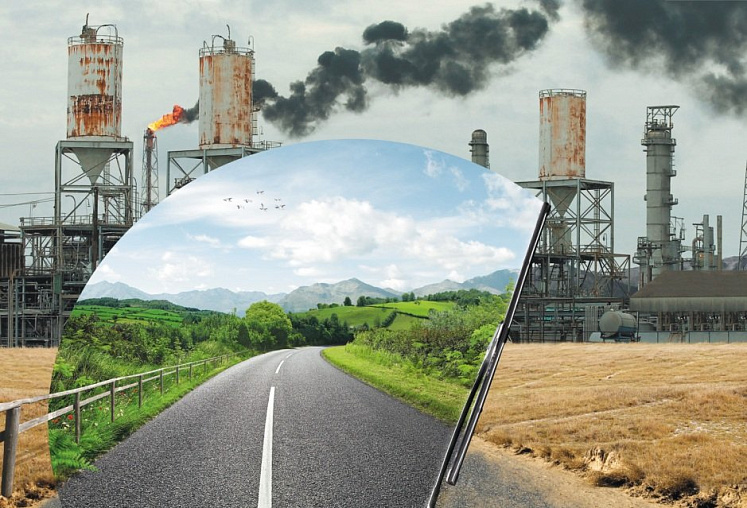20.04.01 Technosphere safety
The professional activity of graduates under the Technosphere Safety training program includes: ensuring human safety in the modern world, forming of a comfortable technosphere environment for human life and activities, minimizing the technogenic impact on the environment, preserving human life and health through the use of modern technical means, and control methods and forecasting.
Level of education:
Master’s Degree
Form of training:
Full-time (day department)
Venue of training:
Moscow
Entrance exams:
— Chemistry
Programs, specializations:
Ecology and industrial safety of areas with high anthropogenic impact

In the course of training, students acquire knowledge and skills that allow them to engage in professional activity aimed at the maximum environmental safety and the reduction of the consequences of the negative anthropogenic effect on nature, particularly, in areas with a high anthropogenic impact.
A distinctive feature and advantage of the program is a balanced combination of the environmental component - issues, tasks and technologies aimed to protect the natural environment, - and the topics relating to the protection of human life and health in conditions of technogenic risks and emergencies.
A distinctive feature and advantage of the program is a balanced combination of the environmental component - issues, tasks and technologies aimed to protect the natural environment, - and the topics relating to the protection of human life and health in conditions of technogenic risks and emergencies.
Alumni can be employed as
- specialists in the operation of water treatment facilities
- environmental Engineers
- heads of Environmental Safety Department
- occupational safety engineers
- design engineers
- heads of the Environmental Protection Department
- specialists in the development of environmental documentation
- government inspectors in the field of environmental protection
- experts of state supervisory authorities
Program subjects
- Processes and devices for the protection of the atmosphere
- System analysis and enterprise management in emergency situations
- Processes and devices for the protection of water bodies and soils
- Expertise of safety of hazardous production facilities
- Modern problems of science in the field of environmental protection
- Design of systems to ensure environmental safety
- Environmental safety management
- Energy and resource saving technologies
- Additional chapters of mathematics
- Special chapters of environmental chemistry
- Software products for environmental protection
- Fundamentals of biochemistry in relation to technosphere safety
- Ecological and economic analysis of modern technologies
- History and methodology of science in the field of environmental protection
Department of Environmental and Industrial Safety
- Educational Activity
-
Institutes
- Institute of Information Technologies
-
Institute of Artificial Intelligence
- About the Institute
- Institute Administration
- History of the Institute
-
Training programs
- Bachelor's Degree Programs
-
Master's Degree Programs
- 01.04.02 Applied mathematics and information science
- 09.04.01. Informatics and computer engineering
- 12.04.04 Biotechnical systems and technologies
- 15.04.04 Automation of technological processes and production
- 15.04.06 Mechatronics and robotics
- 27.04.03 System analysis and management
- 27.04.04 Engineering system control
- Infrastructure
- Alumni
- Contacts
- Institute for Cybersecurity and Digital Technologies
-
Institute for Advanced Technologies and Industrial Programming
- About the Institute
- Institute Administration
- History of the Institute
-
Training programs
-
Bachelor's Degree Programs
- 09.03.02 Information systems and technologies
- 11.03.04 Electronics and nanoelectronics
- 12.03.05 Laser technology and laser techniques
- 15.03.01 Mechanical engineering
- 22.03.01 Materials science and technology
- 27.03.01 Standardization and metrology
- 28.03.01 Nanotechnology and microsystems engineering
- 29.03.04 Decorative material working techniques
- 54.03.01 Graphic design
-
Master's Degree Programs
- 09.04.02. Information systems and technologies
- 11.04.04 Electronics and nanoelectronics
- 12.04.02 Optical engineering
- 15.04.01 Mechanical engineering
- 22.04.01 Materials science and technology
- 27.04.01 Standardization and metrology
- 29.04.04 Decorative material working techniques
- 54.04.01 Graphic design
-
Bachelor's Degree Programs
- Infrastructure
- Alumni
- Contacts
- Institute of Radio Electronics and Informatics
- Institute of Management Technologies
- Lomonosov Institute of Fine Chemical Technologies
- Institute of International Education
-
Mega-Laboratories
- Motion Capture Laboratory
- Immersive Technologies Laboratory
- Laboratory for the Development and Transfer of Microfluidic Technologies (DTMT)
- Cell Technologies Megalaboratory operating on the basis of the Department of Chemistry and Technology of Biologically Active Compounds, Medical and Organic Chemistry named after N.A. Preobrazhensky
- General Biotechnology Megalaboratory
- Industry 4.0: Digital Robotized Production center
- Laboratory of Intelligent Autonomous and Multi-Agent Robotic Systems
- Research and Educational Center for Biosynthesis, Isolation and Purification of Monoclonal Antibodies (Generium)
- Rare and Precious Metals Research and Technological Center operating on the basis of the Department of Chemistry and Technology of Rare Elements named after K.A. Bolshakov
- Laboratory of Analytic, Modeling, Design and Digital Prototyping Technologies
- Import Substitution of Information Technologies Educational and scientific testing complex
- Smart Production Systems Educational and Scientific Center
- Elastomers. Thermoplastics. Technologies Educational and Research Center operating on the basis of the Department of Chemistry and Technology of Elastomer Processing named after F.F. Koshelev
- Catalytic and Mass Exchange Processes center
- Center of Innovative Technologies in Microelectronics
- Center for Cybersports Robotics
- Mobile Robotics University Laboratory
- Radio electronic Technologies Megalaboratory
- Departmental Situation Center of the Ministry of Science and Higher Education of the Russian Federation for monitoring the sphere of education and science
- Scientific and Educational Center for Medical Radiology and Dosimetry
- Laboratory of Geographic Information Systems and Technologies
- Educational and Research Center for Space Monitoring ("CosMoCenter")
- Additive Polymer Technologies Center
- Cyber Threat Research Megalaboratory
- Digital Center of Rosatom State Corporation
- Laser Technologies Megalaboratory
- Mathematical Modeling and Artificial Intelligence Megalaboratory
- Megalaboratory of Digital and Additive Technologies in Mechanical Engineering
- Nanomaterials and Nanostructures Diagnostics Center
- Techno-coworking
- TESLA Educational and Research Center
- Bachelor's Degree Programs
- Master's Degree Programs
- Additional Education Programs
- Physical Education and Sports
© 2026 MIREA - Russian Technological University




